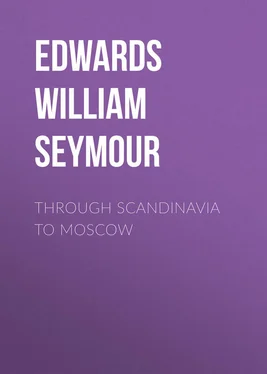William Edwards - Through Scandinavia to Moscow
Здесь есть возможность читать онлайн «William Edwards - Through Scandinavia to Moscow» — ознакомительный отрывок электронной книги совершенно бесплатно, а после прочтения отрывка купить полную версию. В некоторых случаях можно слушать аудио, скачать через торрент в формате fb2 и присутствует краткое содержание. Жанр: foreign_antique, foreign_prose, Путешествия и география, на английском языке. Описание произведения, (предисловие) а так же отзывы посетителей доступны на портале библиотеки ЛибКат.
- Название:Through Scandinavia to Moscow
- Автор:
- Жанр:
- Год:неизвестен
- ISBN:нет данных
- Рейтинг книги:4 / 5. Голосов: 1
-
Избранное:Добавить в избранное
- Отзывы:
-
Ваша оценка:
- 80
- 1
- 2
- 3
- 4
- 5
Through Scandinavia to Moscow: краткое содержание, описание и аннотация
Предлагаем к чтению аннотацию, описание, краткое содержание или предисловие (зависит от того, что написал сам автор книги «Through Scandinavia to Moscow»). Если вы не нашли необходимую информацию о книге — напишите в комментариях, мы постараемся отыскать её.
Through Scandinavia to Moscow — читать онлайн ознакомительный отрывок
Ниже представлен текст книги, разбитый по страницам. Система сохранения места последней прочитанной страницы, позволяет с удобством читать онлайн бесплатно книгу «Through Scandinavia to Moscow», без необходимости каждый раз заново искать на чём Вы остановились. Поставьте закладку, и сможете в любой момент перейти на страницу, на которой закончили чтение.
Интервал:
Закладка:
William Seymour Edwards
Through Scandinavia to Moscow
I
London to Denmark Across the North Sea
We came down from London to Harwich toward the end of the day. Our train was a “Special” running to catch the steamer for Denmark. We were delayed a couple of hours in the dingy, dirty London station by reason of a great fog which had crept in over Harwich from the North Sea, and then, the boat had to wait upon the tide.
The instant the train backed in alongside the station platform – only ten minutes before it would pull out – there was the usual scramble and grab to seize a seat in the first-carriage-you-can and pandemonium reigned. H is well trained by this time, however, and I quickly had her comfortably ensconced in a seat by a window with bags and shawls pyramided by her side the better to hold a place for me. Meantime, I hurried to a truck where stood awaiting me a well-tipped porter and together we safely stowed two “boxes” into a certain particular “luggage van,” the number of which I was careful to note so that I might be sure quickly to find the “luggage” again, when we should arrive at Harwich, else a stranger might walk off with it as aptly as with his own.
Our “carriage” was packed “full-up” with several men and women, who looked dourly at us and at each other as they sat glumly squeezed together, elbows in each other’s ribs. So forbidding was the prospect confronting me that I did not presume to attempt a conversation. These comrades, however, soon dropped out at the way-stations, until only one lone man was left, when I took heart and made bold to accost him. I found him very civil and, recognizing me to be a foreign visitor, he spoke with freedom. One Englishman never forgives another for sitting beside him, unintroduced, and squeezing him up in a railway carriage; but he harbors no such grudge against his American cousin, equally the victim of British methods.
Our vis-à-vis had been a volunteer-trooper in South Africa, and had just come back to England, after two years’ hardship and exposure. He had given up a good position in order to serve his country, and had been promised that the place would be kept open for him against his return. He tells me he now finds a stay-at-home holds his job. He has “a wife and two little lads to keep,” and so far he has had “no luck in finding work.” There are thousands of others in as bad a fix as he, he says, returned patriots who are starving for lack of work. He denounced the entire Boer-smashing business most savagely and declared that as for South Africa, he “would not take the whole of it for a gift.” We hear this sort of talk everywhere among the people we casually meet. The average Englishman takes small pride in his Army. “It gives fat jobs to the aristocracy, it is death to us,” is what I have heard a dozen times remarked. Our new acquaintance seemed to feel the better for having thus spoken out his mind, and when we parted, wished us a “prosperous voyage.”
The ship was in motion within twenty minutes after our train reached the Harwich pier. To my landsman’s thinking the air was yet murky with the fog. Big sirens were booming all about us. The melancholy clang of tidal bells sounded in sombre muffled tones from many anchored buoys. It was a drear, dank night to leave the land. We moved slowly, sounding our own hoarse whistle all the while. I stood upon the upper deck peering into the mists till we had come well out to sea. There were few boats moving, no big ones. Multitudes of small schooners and sloops rode at anchor, their danger lights faintly gleaming. I wondered we did not run down and crush them, but the pilot seemed to apprehend the presence of another boat even before the smallest ray of light shone through the fog. One or two great ships we came shockingly close upon. At least, I was jarred more than once when their huge black hulks and reaching masts suddenly grew up before me out of the dead white curtain of the mists. The estuary which leads from Harwich to the sea is long and tortuous. Only a pilot who has been born upon it, and from boyhood learned its currents and its tides, its shallows and its shoals, may dare to guide a boat along it, even in broad day. How much greater the skill and knowledge required thus to steer a ship through these labyrinthine channels amidst the fogs and blackness of such a night! The Captain told me he was always uneasy when coming out, no matter when, and never felt safe until far out upon the sea. Even in open water he must keep the sharpest kind of a watch lest some one of the myriad fishing craft which haunt these waters, should lie athwart the way.
The sea was quiet, rolling with a long slow swell. The rising wind soughed softly through the rigging when, toward midnight, I at last turned in.
All day Sunday the North Sea lay smooth and glassy as a pond; no hint of the turmoil and tempest which so often rage upon its shallow depths. We did not see many vessels; far to the north I made out the smoke of a steamer which the captain said was bound for Kristiansand, in Norway; and south of us were a few sail, which I took to be fishing luggers from Holland. Nor were there many seabirds flying. The sky hung low and in the gray air was the feel of a storm in the offing. Toward dark, about eight o’clock, a misty rain settled down upon us, and the rising wind began swashing the dripping waters along the decks. Toward half past nine we descried a dim glimmer in the east, – a beacon light flickering through the night, – and then another with different intervals of flash, a mile or two out upon the left, and then our ears caught the deep bellow of a fog horn across the sea. We were nearing the west coast of the Province of Jutland, in Denmark. Our port lay dead ahead between the lights. Another hour of cautious navigating, for there are many sand bars and shifting shoals along this coast, and we came steaming slowly, very slowly, among trembling lights – fishing smacks at anchor with their night signals burning – and then we crept up to a big black wharf. We were arrived at Esbjerg.
The train for Copenhagen (Kjoebenhavn) would leave at midnight, an eight-hours’ ride and no sleeping car attached.
We decided to stay aboard the ship, sleep peacefully in our wide-berthed stateroom and take a train at eleven o’clock of the morning, which would give us a daylight ride.
We were entering Denmark by the back door. The sea-loving traveler generally approaches by one of the ocean liners which sail direct from New York to Copenhagen; those who find terror in the sea enter by way of Kiel, and an all-rail ride through Holland and Germany, crossing the channel to Ostend, Dieppe, or the Hook. Only the few voyage across the North Sea with its frequent storms – the few who, like ourselves, are good sailors and do not fear the stress of tide and tempest. We were now at Esbjerg, and must cross the entire peninsula of Denmark, its Little Belt, its Big Belt and the large islands of Funen and Zealand to reach our journey’s end.
I am already beginning to pick up the Danish speech, a mixture of English, German, Dutch and new strange throat gutturals, the latter difficult for an American larynx to make. And yet so similar is this mother tongue of Scandinavia to the modern English, that I can often tell what a Dane is saying by the very similarity of the sounds: “Go Morn” – (good morning), “Farvel” – (farewell).
Our fellow passengers were mostly Danes. This is their favorite route for coming home. They are a quiet, rather pensive people. The men, much of the time, were smoking, and drinking beer and a white brandy. The women were often sitting in the smoking room with them, enjoying, I presume, the perfume of tobacco, as every right-minded woman should, and it may be, also finding solace in the scent of the strong brown beer, which they are not themselves indisposed to quaff.
Читать дальшеИнтервал:
Закладка:
Похожие книги на «Through Scandinavia to Moscow»
Представляем Вашему вниманию похожие книги на «Through Scandinavia to Moscow» списком для выбора. Мы отобрали схожую по названию и смыслу литературу в надежде предоставить читателям больше вариантов отыскать новые, интересные, ещё непрочитанные произведения.
Обсуждение, отзывы о книге «Through Scandinavia to Moscow» и просто собственные мнения читателей. Оставьте ваши комментарии, напишите, что Вы думаете о произведении, его смысле или главных героях. Укажите что конкретно понравилось, а что нет, и почему Вы так считаете.












